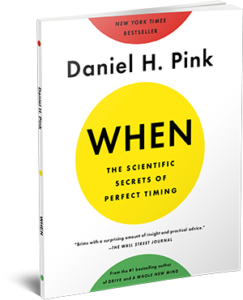This was an enjoyable book crammed with scientific studies, practical advice and thoughts about our relationship with time. Lots of info on when to do all kinds of things as hold meetings, change jobs or make other life decisions….as well as tips to improve productivity such as short breaks and getting away from your desk for lunch. Here’s a couple things I thought were interesting…

When should you go first?
- If you’re on a ballot
- If you’re not the default choice
- If there are relatively few competitors (tendency to remember things earlier in a short series)
- If you are up against several strong candidates (strong applicants upfront cause flaws in later ones to seem greater)
When should you NOT go first?
- When you are the default choice
- If there are many competitors (later on is better, last is strongest)
- Operating in an uncertain environment (watch others go first)
- Meager competition (highlight your differences)
On mid-point malaise:
When team commitment to achieving a goal is high, it is best to emphasize the work that remains, but if team commitment is low, it’s wiser to emphasize the progress that has already been made, even if it’s not massive.
File under things I’ve definitely experienced first-hand:
Feelings of belonging boost job satisfaction and performance. Research by Alex Pentland at MIT has shown that the more cohesive and communicative a group is – the more they chat and gossip – the more they get done.
This bit right here has made me resolve to get my diary keeping restarted: Harvard researchers asked people to make small time capsules of mundane recent moments…favorite songs, recent conversation, etc. Then they asked people to guess how curious they’d be about seeing the contents in the future.
“When the time came to view the time capsules, people were far more curious than they had predicted. They also found the contents of what they had memorialized far more meaningful than they had expected. …people underestimated the value of rediscovering current experiences in the future. By recording ordinary moments today, one can make the present a “present” for the future.
I was so good at keeping up my “daily pages” for about five years, but for the last couple I have largely neglected it. I love to go back and read up on what little Felix was doing and compare that to now (or to Dexter at the same age) and I have regrets about not keeping up more recent times. So much has happened and so many little details are mostly gone to time now. Need to find a way to make it the first thing I do when I hit the couch at night!